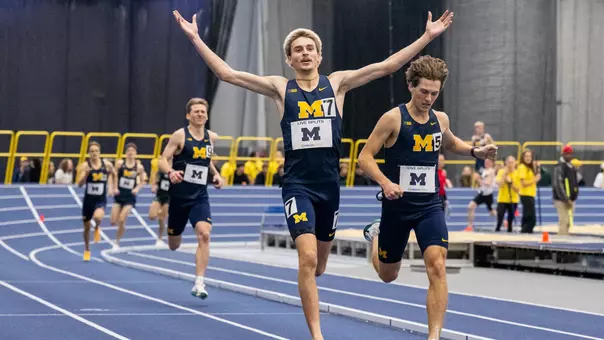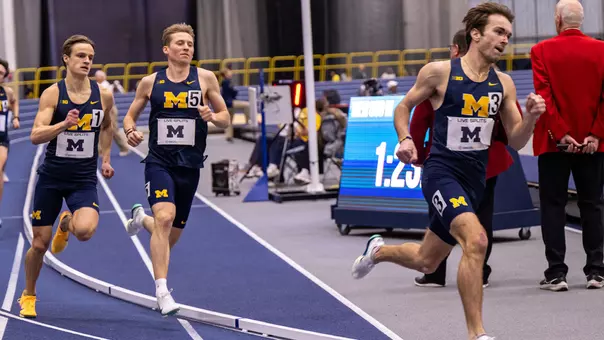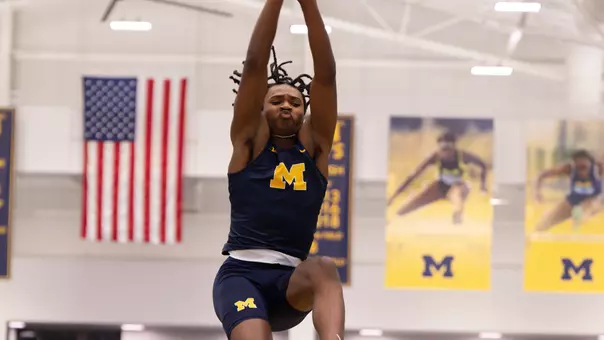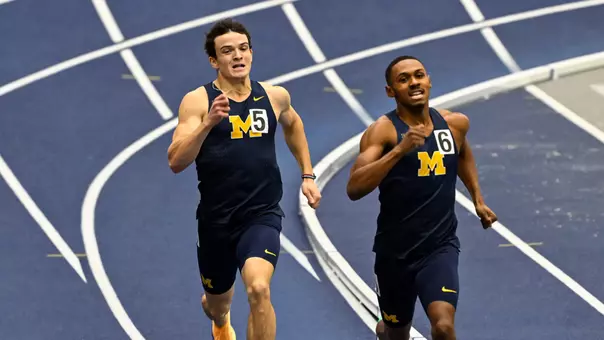Ferlic, Scavelli Awarded Big Ten Postgraduate Scholarships
5/12/2016 12:00:00 AM | Field Hockey, General, Men's Cross Country, Men's Track & Field
May 12, 2016

ROSEMONT, Ill. -- The Big Ten Conference Office announced on Thursday (May 12) that University of Michigan senior student-athletes Mason Ferlic (men's track and field and cross country) and Shannon Scavelli (field hockey) have been awarded 2016 Big Ten Postgraduate Scholarships. Ferlic and Scavelli, who were both awarded this year's Big Ten Medal of Honor last month, were selected as Michigan's recipients by a committee of faculty and staff from the institution.
Ferlic, an aerospace engineering master's student, has been a USTFCCCA Academic All-American (2014) and a Capital One Academic All-America second team (2015) and third team (2014) honoree for his work in the classroom. Hailing from Mounds Park, Minnesota, he has earned USTFCCCA All-Academic honors during the cross country (2014-15) and track and field seasons (2013-14-15) and has accumulated six total Academic All-Big Ten accolades along with Big Ten Distinguished Scholar honors in 2015.
On the track, Ferlic has already met the Olympic standard for the 3,000-meter steeplechase with the NCAA-leading performance (8:28.77) he recorded earlier this month. He is also a four-time USTFCCCA All-American with a pair of first-team honors. This indoor season, he ran the anchor leg of the DMR group that broke U-M's 12-year-old program record long held by the 2004 national champion relay team and went on to help earn Michigan's first All-America honors in the event since 2007. He owns a pair of Big Ten titles in the indoor 5,000-meter run (2015-16) and another in the outdoor 3,000-meter steeplechase (2015) and helped U-M to its best indoor season since 2009 with a fourth-place finish this winter.
In cross country, Ferlic has accumulated one national Athlete of the Week accolade, three All-Great Lakes Region honors (2013-14-15) and three All-Big Ten recognitions (first team; 2014-15, second team; 2013). Last fall, he helped the team to its most successful season in nearly 20 years by leading the Wolverines to their first Big Ten Title since 1998 and the program's first Big Ten and Great Lakes Regional title sweep since 1997, led by his individual title at the regional meet. In all, he has tallied 11 Big Ten Athlete of the Week honors (six cross country; five track and field) during his career.
Scavelli, who graduated this spring with a bachelor's degree in psychology, is the first Michigan field hockey player to earn the prestigious Medal of Honor. A team captain and four-year starter for the Wolverines, Scavelli is a three-time Academic All-Big Ten and NFHCA Academic Squad honoree and two two-time Big Ten Distinguished Scholar. She also claimed the Rachael Townsend Award, given annually to the student-athlete(s) who make significant and selfless contributions to the community through their time, talent and dedication throughout the year.
On the field, Scavelli ranked among U-M's leading scorers this season with a career-best nine goals, three assists and 22 assists. She boasted three game-winners, including the lone goal against No. 9 Stanford, as well as the late game-tying tally at No. 16 Northwestern. She was named to the NHFCA All-West Region first team, adding to her 2014 second team nod, and All-Big Ten first team. She played in 84 games over her four-year career, starting 71 on the forward line and compiled 24 career goals, 10 assists and 58 points.
Scavelli will enroll in Michigan's Master of Social Work program in the fall.
Each Big Ten institution developed its own on-campus selection process when awarding the scholarship. Student-athletes must have maintained at least a 3.2 grade-point average, demonstrated leadership qualities, served as an excellent role model and intended to continue their academic work beyond their baccalaureate degree at a graduate degree program.
The scholarship will be used to pay expenses of the student's postgraduate education to include such related activities as research and teaching, as well as other expenses such as tuition, fees, room and board, required course-related supplies and books. In order to retain the scholarship, the recipient must be accepted into a full-time graduate degree program within three years from the fall semester after selection.
Communications Contacts: Leah Howard, Chad Shepard










